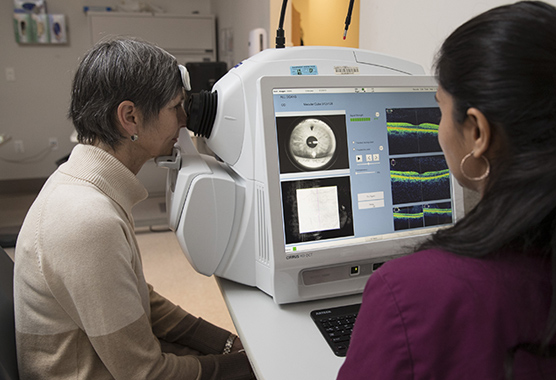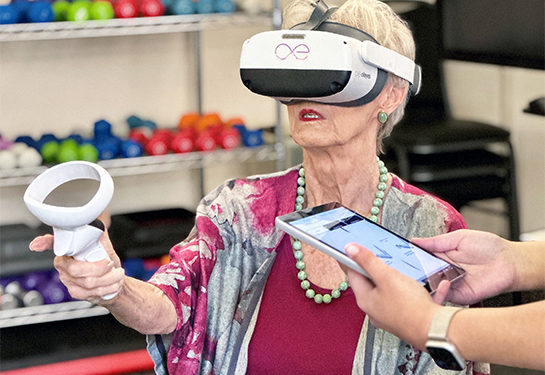Diabetic Retinopathy
Vision is vital to your quality of life. We’re passionate about preventing and treating retina damage caused by diabetes.
Medically reviewed by Michele Lim, M.D. on Oct. 29, 2024.

Diabetic Retinopathy
Diabetic retinopathy, or diabetes-related retinopathy, is an eye disease that happens in some people with type 1 or type 2 diabetes. Over time, uncontrolled high blood sugar may damage the blood vessels in your retina.
Your retina helps your brain convert light into images. A damaged retina causes blurry vision and may eventually lead to blindness.
The UC Davis Eye Center uses the most advanced technology to diagnose and treat diabetic retinopathy. Our specialized team aims to preserve your vision and quality of life.
Diabetic Retinopathy Symptoms
You may not have any symptoms of diabetic retinopathy at first. But over time, symptoms typically become worse.
Common Symptoms
You may experience:
- Blind spots
- Blurry vision
- Color blindness
- Flashes, floaters, spots or streaks in your vision
- Poor night vision
Emergency Symptoms
Get medical attention or call 911 if you experience:
- Sudden vision loss
Diabetic Retinopathy Causes and Risk Factors
Long-term high blood sugar causes damage in your eye that leads to diabetic retinopathy. Factors that raise your risk for diabetic retinopathy include:
Age
The longer you have diabetes, the higher your chance of developing retinopathy. That means that older people have a higher risk.
High Blood Pressure
Having high blood pressure and diabetes raises your risk of retinopathy.
High Cholesterol
Having high cholesterol along with diabetes increases your risk of retinopathy.
Smoking
Having diabetes and using tobacco puts you at greater risk for diabetic retinopathy.
Diagnosing Diabetic Retinopathy
Our eye center’s Retina Service specializes in diabetic retinopathy. We use state-of-the-art equipment that isn’t available in a typical eye doctor’s office.
Your eye specialist will perform an eye exam to determine how well you’re seeing. You will also get special scans and imaging services to pinpoint any problems with your eyes. Our Ophthalmic Imaging Center uses some of the most advanced technology available in the region.
Additionally, the UC Davis Diabetic Teleophthalmology screening program is available to our patients at our primary care clinics. It’s a network of artificial intelligence (AI) assisted cameras that painlessly take a photograph of the back of the eye (where diabetic damage can occur) without the need for dilation. The AI-assisted cameras quickly screen for diabetic retinopathy and alert your provider if there’s diabetic eye disease.
Diabetic Retinopathy Treatments at UC Davis Health
In our Yiu Lab, our specialists are helping pioneer new treatments for diabetic retinopathy. We also participate in clinical studies, so we stay current on the latest treatment techniques.
Treatment for diabetic retinopathy depends on how severe the condition is. You may be eligible to take part in clinical trials for new treatments. Your treatment for diabetic retinopathy may include:
Laser Surgery
Laser surgery is a minimally invasive procedure to repair blood vessel damage that causes vision loss.
Retinal Detachment Surgery
Our specialists perform the most advanced procedures for retina reattachment.
Vitrectomy
Vitrectomy is a minimally invasive procedure. It improves cloudy vision by repairing blood vessels and removing scar tissue in your eye. This outpatient surgery doesn’t require an overnight hospital stay.
Preventing Diabetic Retinopathy
Take these steps to lower your risk of diabetic retinopathy:
Avoid or Quit Smoking
Tobacco use increases your risk for this condition. If you need help quitting, your provider can work with you to make a plan to stop.
Get Yearly Eye Exams
Don’t skip your yearly eye exam. The earlier your eye specialist spots a problem, the better your chances of preserving your vision.
Manage Cholesterol, Blood Pressure and Blood Sugar
Keeping your cholesterol, blood pressure and blood sugar in a healthy range lowers your risk of diabetic retinopathy.
Who does it affect?
9.6MPeople in the U.S. have diabetic retinopathy
Source: JAMA Network: Prevalence of Diabetic Retinopathy in the US in 2021
Request an Appointment
As Sacramento's No. 1 hospital, you'll benefit from unique advantages in primary care and specialty care. This includes prevention, diagnosis and treatment options from experts in 150 specialties.
Referring Physicians
To refer a patient, submit an electronic referral form or call.
800-4-UCDAVIS
Patients
Call to make an appointment.
Consumer Resource Center
800-2-UCDAVIS

Ranked among the nation’s best hospitals
A U.S. News & World Report best hospital in cardiology, heart & vascular surgery, diabetes & endocrinology, ENT, geriatrics, neurology & neurosurgery, and pulmonology & lung surgery.

Ranked among the nation’s best children’s hospitals
U.S. News & World Report ranked UC Davis Children’s Hospital among the best in pediatric nephrology, orthopedics*, and pulmonology & lung surgery. (*Together with Shriners Children’s Northern California)

Ranked Sacramento’s #1 hospital
Ranked Sacramento’s #1 hospital by U.S. News, and high-performing in aortic valve surgery, back surgery (spinal fusion), COPD, colon cancer surgery, diabetes, gynecological cancer surgery, heart arrhythmia, heart failure, kidney failure, leukemia, lymphoma & myeloma, lung cancer surgery, pacemaker implantation, pneumonia, prostate cancer surgery, stroke, TAVR, cancer, orthopedics, gastroenterology & GI surgery, and urology.

The nation’s highest nursing honor
UC Davis Medical Center has received Magnet® recognition, the nation’s highest honor for nursing excellence.

World-class cancer care
One of ~59 U.S. cancer centers designated “comprehensive” by the National Cancer Institute.

A leader in health care equality
For the 13th consecutive year, UC Davis Medical Center has been recognized as an LGBTQ+ Healthcare Equality Leader by the educational arm of America’s largest civil rights organization.

